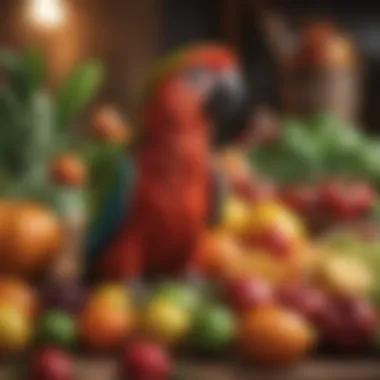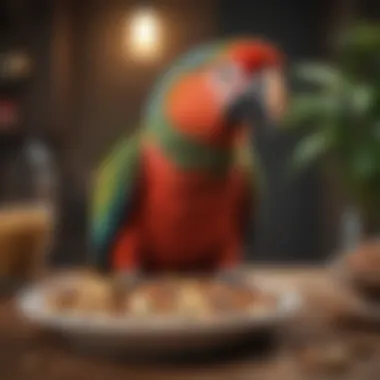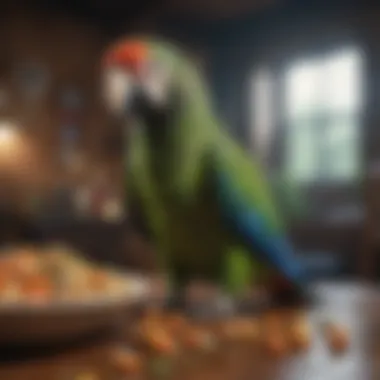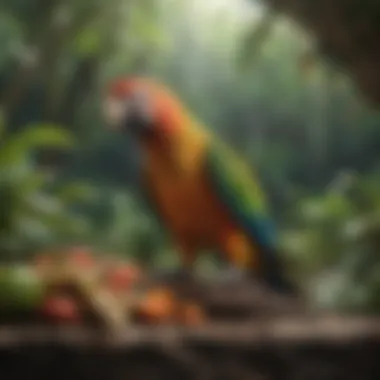Exploring Island Treats: A Guide to Parrot Nutrition


Intro
Parrots are enchanting creatures, renowned for their intelligence and vibrant personalities. When considering the diet of these remarkable birds, the focus on nutrition is crucial. As pet owners and enthusiasts, understanding what fuels their health is essential. One exciting avenue to explore is the realm of island treats. This guide aims to shed light on these unique items, their components, and how they contribute to a parrot's overall well-being. The subsequent sections will delve into the nuances that define a parrot's diet, ensuring your feathered companion receives the best possible care.
Understanding Your Pet
Pet Behavior Basics
Understanding parrot behavior is foundational for any pet owner. Parrots are social animals, thriving on interaction and stimulation. They express their emotions through vocalizations and body language. Observing these cues can aid in recognizing their needs and preferences. Understanding basic behavior not only enhances the bond between owner and bird but can also inform their dietary choices.
Common Breed Characteristics
Different species of parrots exhibit distinct traits. For instance, the African Grey is celebrated for its cognitive abilities, whereas the Budgerigar is known for its more playful demeanor. Familiarity with breed characteristics can guide pet owners in choosing the most suitable island treats that align with their parrot's natural inclinations and dietary requirements.
Species-Specific Needs
Each parrot species comes with its own set of dietary needs. Larger parrots may require higher protein intake compared to smaller ones. Likewise, some species might thrive on fruits, while others may benefit more from a grain-based diet. Understanding specific nutritional requirements is vital for selecting island treats that provide essential vitamins and minerals. Pet owners should consider consulting with a veterinarian to understand their parrot's individual needs better.
Pet Care and Maintenance
Feeding Guidelines
Establishing a proper feeding routine is essential. Island treats can be introduced as part of a balanced diet. These treats should complement a base diet that typically includes pellets, fresh fruits, and vegetables. When incorporating island treats, moderation is key. Too many can lead to nutritional imbalances, negating their benefits.
Grooming Essentials
Regular grooming is a vital aspect of parrot care. This includes trimming nails and, occasionally, wings. While grooming does not directly relate to diet, a well-groomed parrot is usually healthier and more active, making them more inclined to explore various foods, including island treats.
Hygiene Practices
Maintaining a clean environment is crucial for parrot health. Food and water dishes should be washed daily to prevent contamination. Leftover island treat crumbs can attract pests. Keeping their living space tidy is not only hygienic but also fosters a healthier appetite and reduces the risk of illness.
Training and Development
Basic Commands and Skills
Training parrots to follow basic commands can enrich their lives. Incorporating food, including island treats, as rewards can motivate them during training. Positive reinforcement is effective for teaching skills, creating an engaging environment.
Behavioral Training Techniques
Techniques vary, but consistency is crucial. Scheduling training sessions should align with feeding times. This encourages parrots to view training positively. Using island treats as incentives can foster good behavior and expand their skill set.
Addressing Common Behavior Issues
Behavior problems can stem from various factors, including boredom or diet. If a parrot exhibits negative behavior, it may be worthwhile to reconsider their food choices. Incorporating island treats may help alleviate some issues by providing necessary enrichment and variety.
Health and Wellness
Routine Vet Check-ups
Regular visits to an avian veterinarian are essential. These professionals can monitor a parrot's health and nutritional status. Routine checks and blood tests can identify potential deficiencies early, allowing owners to adjust diets accordingly.
Vaccination Needs
Vaccinations are crucial for preventing diseases. Pet owners should ensure their parrots are up to date on any recommended shots. Consult with a veterinarian for guidance on vaccination protocols specific to their birds.
Recognizing Signs of Illness
Being alert to signs of illness can be life-saving. Change in appetite, lethargy, or unusual vocalizations may indicate issues. If a parrot stops eating their regular food, including island treats, it can be a sign of health problems. Early detection is key.
Enrichment and Activities
Indoor vs.


Outdoor Activities
Enrichment fosters both mental and physical health. Indoor activities can include toy exploration and foraging activities. Outdoor time should be supervised, allowing parrots exposure to new experiences. Both environments can be enhanced with different types of island treats that encourage exploration and interaction.
Interactive Toys and Games
Engaging parrots in play is vital. Using toys that challenge their minds can facilitate learning. Incorporating rewards, such as island treats, can keep their interest high. Choosing interactive toys can also encourage physical activity.
Socialization Opportunities
Socializing with other birds or pets can improve a parrot's emotional well-being. Watching and interacting with other creatures can provide additional enrichment. Consider using island treats as part of social activities to strengthen bonds and enhance experiences.
The right diet can transform a parrot's life, encouraging healthy behavior and reducing repeated training issues.
This guide presents a robust framework for understanding the dietary needs of parrots through island treats. With the provided information, pet owners can ensure their parrots lead fulfilling and healthy lives.
Prolusion to Parrot Nutrition
Parrot nutrition is a vital aspect of maintaining the health and well-being of these intelligent and social birds. Understanding the dietary needs of parrots is crucial for any pet owner. A well-balanced diet can prevent numerous health issues and ensure a long and vibrant life for these companions. Both the quality and diversity of their food are essential. This article aims to provide insights into these dietary needs, emphasizing the unique aspect of island treats as a beneficial component of a parrot's diet.
Understanding Parrot Dietary Needs
Parrots have specific dietary requirements that distinguish them from other pets. In the wild, their diet consists of fruits, seeds, nuts, and vegetation. Each ingredient plays a role in fulfilling their nutritional needs. For instance, the high-fat content found in nuts is important for energy. On the other hand, fruits contribute vitamins and antioxidants.
When formulating a diet for a pet parrot, owners should consider several factors. These include the size, species, and age of the bird. Each type of parrot may have unique preferences and health requirements. Thus, it is essential to tailor their diet accordingly. Providing a varied diet can stimulate their natural foraging instincts, which is crucial for mental health.
Importance of a Balanced Diet
A balanced diet is the cornerstone of parrot health. It encompasses a mix of fresh fruits, vegetables, grains, and proteins. Each category provides necessary nutrients, which aid in growth, plumage health, and overall vitality. For example, leafy greens are rich in vitamins, while fruits can offer hydration and sugars.
Maintaining a proper balance helps in preventing obesity, a common issue among pet parrots. As these birds can be prone to weight gain, it is vital to monitor their food choices and portion sizes. Educating oneself about proper feeding practices can lead to better health outcomes.
Providing a varied diet not only improves health but enhances a bird's quality of life.
Defining Island Treats for Parrots
Island treats represent a niche within parrot nutrition that is rich in flavor, variety, and essential nutrients. These treats not only cater to the tastes of parrots but also enhance their health. They stem from diverse cultures and regions, offering a glimpse into the culinary treasures that can be beneficial for our feathered friends. Understanding island treats is crucial for pet owners aiming to provide a well-rounded diet that satisfies both nutritional needs and behavioral enrichment.
Origins and Cultural Significance
Historically, island treats are influenced by the diverse flora and fauna of tropical and subtropical regions. Many cultures that cherish parrots, such as those in the Caribbean and Pacific Islands, have used local ingredients to create diets that support the health of these intelligent birds.
In these regions, ingredients such as exotic fruits and nuts are commonly found. These offerings are often rooted in traditional practices where parrots are seen as integral parts of the environment and culture. The significance of these treats goes beyond mere feeding; they symbolize a connection with nature and sustainability. By incorporating island treats into a parrot's diet, owners can pay homage to these cultural practices while promoting the well-being of their pets.
Common Ingredients in Island Treats
Island treats comprise various ingredients that fulfill the dietary requirements of parrots. Common elements include:
- Fruits: Tropical fruits like papaya, mango, and guava are rich in vitamins and moisture, appealing to the parrot’s preference for sweet flavors.
- Nuts: Nuts such as macadamias and cashews provide healthy fats which are important for energy. They also offer essential fatty acids that help maintain healthy feathers.
- Seeds: Seeds like sunflower and pumpkin seeds can be included, as they give a crunchy texture and are popular among parrots. These should be offered in moderation due to their high-fat content.
- Grains: Whole grains like quinoa and brown rice provide carbohydrates that are necessary for energy. They can be mixed with other ingredients to form a balanced diet.
By understanding the specific ingredients found in island treats, pet owners can choose products that meet the unique dietary needs of their parrots, ensuring optimal health and happiness.
Nutritional Benefits of Island Treats
Understanding the nutritional benefits of island treats is crucial for maintaining the health and well-being of pet parrots. These treats not only offer varied flavors but also provide essential nutrients that support overall physiological functions. Island treats can enrich a parrot's diet by introducing a range of fruits, vegetables, seeds, and nuts that may not be present in their standard feed. This diversity is not just about making meals enjoyable; it plays a significant role in nutrition.
Vitamins and Minerals
Island treats often contain an array of vitamins and minerals critical to a parrot's diet. For instance, tropical fruits like papaya and mango are vibrant sources of vitamin C, which is vital for immune function. Calcium-rich options such as certain seeds and leafy greens support bone health, while nuts provide healthy fats, promoting skin and feather condition.
Some key vitamins and minerals include:
- Vitamin A: Essential for vision and immune response, found in yellow and orange fruits.
- Vitamin E: Acts as an antioxidant, promoting cell health and found in nuts and seeds.
- Calcium: Important for strong bones and eggshell formation, found in leafy greens and some seeds.
- Iron: Supports blood health; available in legumes and some grains.
Incorporating these ingredients into a parrot's diet can help prevent deficiencies that might lead to health issues.


Impact on Parrot Health
The impact of island treats on parrot health is profound. A varied diet contributes to better physical and mental health. Parrots are intelligent creatures that require mental stimulation, which can be achieved through the variety in their diet. This cognitive engagement is important because a mundane diet can lead to boredom and related behavioral issues.
Moreover, a well-balanced nutrition plan plays a pivotal role in preventing certain ailments. Here are some benefits:
- Boosted Immunity: A nutritious diet can help to prevent diseases common in parrots, such as feather-plucking and other stress-related behaviors.
- Improved Digestive Health: A variety of ingredients fosters a healthy gut flora, helping with digestion and nutrient absorption.
- Better Feather Quality: Nutrients found in island treats contribute to vibrant plumage, which is an indicator of a parrot’s overall health and vitality.
Types of Island Treats Available
Island treats offer a vibrant variety of food options for parrots. This section focuses on the different types of treats that can be explored. Each category of treats supplies vital nutrients, promotes engagement, and caters to the natural feeding instincts of these birds. Understanding the types of island treats can help parrot owners make informed choices, ensuring the health and happiness of their feathered friends.
Fruits and Vegetables
Fruits and vegetables are fundamental components of island treats. They deliver essential vitamins and minerals crucial for parrot health. Common fruits such as mango, papaya, and coconut provide natural sugars and hydration. Vegetables like sweet potatoes, carrots, and leafy greens are equally important.
Nutritional Value
Fruits and vegetables can elevate the nutritional intake of parrots significantly. For instance, mango contains Vitamin A, which supports eyesight. Likewise, leafy greens are packed with calcium, necessary for strong bones and feathers.
Considerations
When introducing new fruits and vegetables, it's crucial to monitor for any adverse reactions. Always wash fresh produce to remove potential pesticides. Additionally, parrots might have preferences, so it's wise to offer a range of options. A varied diet ensures nutritional diversity and helps avoid boredom.
Seeds and Grains
Seeds and grains form another critical aspect of island treats. They provide energy and are concocted from natural sources. Mixes that combine different seeds can imitate a parrot's natural diet. Sunflower seeds, millet, and quinoa are examples of excellent inclusions.
Benefits
Seeds are rich in fats, which are essential for energy. Grains offer complex carbohydrates, which boost metabolic health. Plus, with proper proportions, seeds and grains can support feather growth and overall vitality.
Serving Recommendations
Care must be taken with portion sizes, as excessive consumption can lead to obesity. It’s best to combine seeds and grains with other nutrients in a balanced diet.
Nuts and Legumes
Nuts and legumes are another delightful treat in a parrot's diet. They are highly nutritious, providing protein and beneficial fats. Almonds, walnuts, and peanuts are popular nut choices. Lentils and chickpeas are excellent for legume inclusion.
Health Advantages
These foods support muscle development and energy. They are also rich in omega fatty acids, which promote healthy skin and feathers.
Important Notes
Due to their high caloric content, nuts should be given in moderation. It’s also good practice to offer unsalted varieties to prevent health issues. Experimenting with small portions allows parrot owners to assess their bird’s preferences and adjust serving sizes accordingly.
Creating a Balanced Diet for Parrots
Creating a balanced diet for parrots is a vital aspect of ensuring their health and well-being. Parrots, known for their intelligence and social behavior, require a diet that not only meets their nutritional needs but also keeps them engaged. The concept of balance in a parrot’s diet can be complex, as it involves understanding the specific needs of the species, their age, and any health considerations. A well-rounded approach incorporates a variety of food groups, such as fruits, vegetables, seeds, nuts, and grains, to provide the necessary nutrients. This diversity helps maintain a healthy weight and prevents deficiencies.
A balanced diet promotes optimal health, a strong immune system, and longevity. Proper nutrition contributes to feather quality, energy levels, and overall behavior. Therefore, pet owners must commit to understanding what constitutes a balanced diet for their unique bird. This includes not only the types of food but also their quality and preparation methods.
Portion Control and Feeding Practices
Portion control is a fundamental practice that ensures parrots do not overeat or under-eat. It is essential to establish appropriate serving sizes based on the parrot’s weight, activity level, and dietary needs. For instance, larger breeds may require a different quantity of food compared to smaller parrots. This difference needs careful attention to avoid obesity or malnutrition.
Feeding practices involve consistency and routine. Establishing a set feeding schedule helps parrots learn when to expect their meals, which can reduce stress. It’s crucial to measure food accurately and avoid free feeding, where food is always available. This method can lead to overeating, which is particularly harmful to parrots that are prone to obesity.
“Effective portion control is not just about limiting food but involves understanding an individual parrot's unique needs.”
Frequency of Feeding Island Treats
The frequency of feeding island treats should be carefully considered. While these treats can be a wonderful addition to a parrot's diet, they should not constitute the majority of their meals. Moderation is key to leveraging the nutritional benefits without overwhelming the bird's system with excess calories or sugars.


Generally, island treats can be offered several times a week as a supplement to the regular diet of pellets and fresh produce. It is essential to observe your parrot's reaction to these treats. Some birds may show a strong preference for certain flavors or textures, which can influence how often they should be fed.
Moreover, introducing new island treats gradually can help prevent digestive issues. Paying attention to the parrot’s overall health and weight will guide adjustments to treat frequency. Always consult with a veterinarian if there are concerns about dietary changes or specific health issues.
Potential Risks Associated with Island Treats
The introduction of island treats into a parrot's diet is beneficial but comes with its own set of risks. As owners of these intelligent birds, it is crucial to recognize the potential challenges associated with feeding island treats. Understanding these risks helps ensure that your parrot maintains optimal health while enjoying the variety these treats offer.
Allergic Reactions and Sensitivities
Allergic reactions are one of the significant concerns when introducing new food items to parrots. Some ingredients commonly found in island treats could trigger sensitivities in certain birds. Peanuts, for instance, can cause allergic reactions in some parrots, leading to symptoms like swelling, itching, or digestive disturbances. Close observation is necessary when offering any new food.
To determine potential allergies, it is advisable to introduce one new treat at a time and monitor for any adverse reactions. If a reaction occurs, discontinue the treat immediately and consult with a veterinarian. It is also crucial to be aware that some parrots may have complex allergies, making it difficult to identify the exact cause of the discomfort.
- Common allergens in island treats include:
- Nuts, especially peanuts
- Citrus fruits
- Certain grains
Staying informed can significantly reduce the risks associated with allergic reactions, ensuring a safe indulgence for your parrot.
Over-feeding and Obesity
Over-feeding is another critical concern that often accompanies the use of island treats. These treats can be high in calories and may lead to obesity if not managed appropriately. Obesity in parrots can result in various health issues, including heart problems, diabetes, and joint disorders. Thus, establishing guidelines for portion control is necessary when integrating island treats into their diet.
Monitoring your parrot's weight and eating habits is essential. Regular visits to the vet can help in assessing their overall health. Feeding island treats should complement their primary diet, rather than replace it.
Tips for Managing Treats:
- Portion Control: Limit the number of treats based on your bird's size and dietary needs.
- Balance: Ensure treats do not exceed 10% of the total diet.
- Regular Check-ups: Schedule routine veterinary check-ups to monitor your parrot's weight and health.
Effective management of treat consumption contributes significantly to your parrot's well-being.
By addressing these potential risks — allergic reactions and obesity — owners can create a fulfilling and health-conscious diet for their parrots, allowing them to enjoy island treats without compromising their health.
Myths and Misconceptions about Parrot Feeding
Understanding myths regarding parrot feeding is crucial to ensuring the well-being and health of these intelligent birds. Misinformation can lead to poor dietary choices that may adversely affect a parrot's lifespan and wellness. This section will dispel common misunderstandings and replace them with factual information grounded in avian nutrition.
Common Misunderstandings
There are several myths about what parrots should eat. One prevalent belief is that all seeds serve as a complete diet. This is incorrect. While seeds can be a part of a parrot's diet, they often lack essential vitamins and nutrients. Moreover, an excessive seed intake can lead to nutritional imbalances.
Another misconception is that parrots only enjoy a limited range of foods. In reality, parrots are naturally curious and will explore a variety of fruits, vegetables, and grains. Feeding them diverse foods not only promotes better health but also enriches their environment.
Lastly, people often think that avian pellets are the only option, which limits the diversity in a parrot's diet. Pellets can be beneficial, but integrating island treats and other fresh foods enhances the overall nutritional profile and makes mealtimes more engaging for the bird.
Clarifying Myths with Facts
When addressing these misunderstandings, it is essential to clarify facts based on research and expert advice.
- Seeds and Nutritional Balance: While seeds can provide energy, they lack the complete nutrition required for a parrot's health. A balanced diet should include fresh fruits, vegetables, and specially formulated pellets or island treats.
- Exploration of Foods: Parrots naturally consume a wide variety of foods in the wild. Encouraging the exploration of different items can lead to a healthier, more stimulating diet. Foods like papaya, mango, and spinach are excellent additions that can be offered in moderation.
- Pellets vs. Variety: While high-quality pellets are a convenient option, parrots thrive on a varied diet. Combining pellets with island treats, fresh produce, and some seeds promotes better health and satisfaction.
The diversity in a parrot's diet is not just a luxury; it is a necessity for their wellbeing.
By addressing these misconceptions and providing accurate information, pet owners can make informed choices, creating a nourishing and satisfying diet for their parrots.
Ending and Recommendations
In summary, the topic of island treats for parrots holds significant importance in ensuring your feathered companions receive the proper nutrition they require. Island treats offer more than just a source of spice or fun in their diet; they represent a carefully crafted blend of flavors and nutrients that can enhance the well-being of your pet. This article has presented an array of insights into the nutritional benefits, appropriate portions, and ingredient sourcing. A holistic approach towards your parrot's diet can lead to various health benefits, longevity, and happiness.
Summary of Key Points
- Island treats are nutritious and flavorful options that enrich a parrot's diet.
- These treats can include various fruits, vegetables, seeds, and nuts that are native to tropical regions.
- A balanced diet is essential for optimal health; over-reliance on treats can lead to nutritional deficits or obesity.
- Understanding allergies and feeding preferences are crucial for tailored dietary choices.
- The article also addresses common myths and misinformation surrounding parrot nutrition, clarifying the best practices for feeding.
Final Thoughts on Island Treats
As we conclude, it is essential to emphasize that incorporating island treats into your parrot's diet should always be done thoughtfully. Each parrot has unique dietary needs that may change over time. You should monitor your bird's responses to different foods and adjust accordingly. Engaging with your pet through treats can create a more fulfilling partnership while enhancing their overall health.
Consider seeking advice from avian nutrition specialists when in doubt regarding portions or specific ingredients. When properly utilized, island treats can lead to a delightful mealtime experience for both you and your parrot.
Remember: A well-informed pet owner is the key to promoting a happy and healthy life for their feathered friend.







